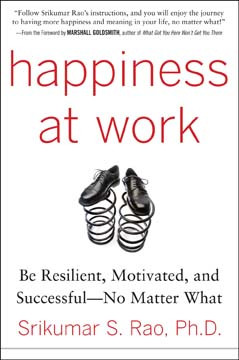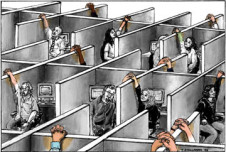In this down economy it’s great to have a job, but it’s even better to have a job where you’re happy at work.
Happiness at work is something Srikumar Rao knows a thing or two about: Happiness at Work is the title of his latest book, and his writings and lectures have earned him the nickname “The Happiness Guru.”
 Srikumar Rao
Srikumar Rao
Rao has taught at various top business schools, including the Columbia Business School and the Haas School of Business at UC Berkeley. He is also a much in-demand lecturer who has spoken at many Fortune 500 companies, including Google, Microsoft, and Goldman Sachs. He was formerly an executive with Warner Communications and McGraw-Hill.
As part of our “Greater Good Podcast” series, Rao recently spoke with host Michael Bergeisen about his ideas for how we can find joy and meaning in even the most challenging jobs. They also discussed some critiques of efforts to coach ourselves into happiness.
You can listen to the interview here, and we encourage you to subscribe to the podcast series through iTunes.
Below we present a condensed version of the discussion.
Michael Bergeisen: What would you say is the single most important thing we can do to find happiness at work?
Srikumar Rao: I think the single most important thing that we can do is to recognize that we do not live in a real world; we live in a construct, and we made it. That’s actually a hugely liberating concept because if what we live in is the reality, then we’re stuck; there’s nothing we can do about it, grin and bear it. But if what we’re living in is a reality, then there’s a lot we can do about it. We can deconstruct the parts of it that are not working, that we don’t like, and build it up again.
MB: So in what sense do you say that we live in a construct, rather than the real world?
SR: We have what I call “mental models.” And a mental model is a notion we have that this is the way the world works.
Now, we’ve got a model for everything: how to get a job, how to get ahead in a job, how to find an apartment, marry, how to bring up children, how to choose a restaurant to eat at.
The problem isn’t that we have models—models are wonderful, time-saving things that we use. The problem is that we don’t recognize that we have models. We think, “This is the way the world works.” But this is not the way the world works; that’s our model of the way the world works, and the more we believe in the model, the more evidence we get that this, in fact, is the way the world works. And very soon, we put ourselves in a silo which we constructed ourselves.
MB: Can you give us an example of a mental model like this?
SR: Okay, take this scenario: You are stuck in a traffic jam, and the air conditioner in your car has failed. You’re hot, sweaty, and stuck. And as you’re moving, somebody suddenly cuts across you, almost causes an accident, then he almost causes another accident, weaving desperately in and out. You got the scenario?
MB: I do.
SR: Okay, now think about your reaction to that person. Would it be fair to say that your thoughts are not those of loving kindness?
MB: Very likely, yes.
SR: Alright. Now suppose I were to share some information with you. The person who behaved in this inconsiderate fashion had just received news that his son was involved in a very serious accident and the doctors had to operate immediately. There wasn’t even any time to get consent. And he’s desperately trying to get to the hospital, and he doesn’t know if he’ll ever see his son alive again.
Now if I shared that information with you, do you feel your thoughts of anger and irritation dissipate, to be replaced by compassion for a fellow human being in a not-so-good situation?
 © Kutay Tanir
© Kutay Tanir
MB: Hopefully, yes.
SR: Okay. So that’s the point I’m trying to make. You don’t really know whether the person who cut you off was an inconsiderate jerk or a distraught father. In all likelihood, you will never know.
But it also doesn’t really matter. You have the choice of deciding which emotional domain you are going to occupy. Much of the time we have this choice in life, and much of the time we occupy the domain which leads to stress, to anger, to frustration. And we do it by default because we don’t recognize that we have a choice, and we instinctively, habitually, choose the one which doesn’t take us to a nice place.
MB: And as you’ve develop your thinking about mental models and how to alter them, have you found science to be useful?
SR: Absolutely. I happen to come from a physics background—I was a physics major as an undergraduate—and I have a structured process, laid out in my book, for you to look at the mental model that you’re using. And within that mental model, there are several assumptions embedded, and you look at them and say, “Is this really true?” And as you start examining them, you’ll be amazed at how many of your strongly held views of the world start collapsing.
MB: I’d like to change gears here and ask you about some critiques of book like yours that offer suggestions for how we can change our psychology. Is it enough to use the suggestions in self-help books, or do we need to make more fundamental changes—deep changes that require more rigorous and consistent efforts than self-help books usually lead to?
SR: Okay, I will not comment on self-help books because I am not a big fan of self-help books, and I do not consider my book a self-help book—that’s very important. I do want your readers to understand that I do not consider my book a self-help book, and let me explain why.
Frequently, at turning points—the two most important turning points, your birthday and New Year’s Day—everybody goes something like, “You know, from now on things are going to be different; I am going to eat healthy, exercise regularly, stop procrastinating, etc.”
By and large, that doesn’t work very well. In fact there’s a reason why exercise clubs sign up many times more members than they can handle in late December: because they know that come January 15, there’s going to be plenty of room on the treadmill sign-up sheets.
Any time you try to bring about behavioral change by an effort or will, you are doing violence to yourself. And most of us try to bring about change by an effort of will, and self-help books give us techniques to use that will better: “I am going to stop eating so much,” “I am going to quit smoking,” etc.

In my program, there is behavioral change; all you’ve got to do is go to my website and read the testimonials yourself. And this change is lasting, and it happens because it does not depend upon an effort of will.
What I do is I get persons to examine the mental models that they are using to view the world, and as you make changes on that level, you literally become a different person. And as you become a different person, behavioral change happens almost effortlessly as a byproduct.
So that is why I like to make a clear distinguish between a typical self-help book and my book. I repeat: I do not consider my book a self-help book.
MB: Alright, fair enough. Let me explore this a bit more. In your book, Happiness at Work, you note that the mind is like a wild horse, often galloping uncontrollably, flitting from subject to subject, which I think any of us who thought about that would definitely agree with. And you also suggest that a key part to finding happiness at work and elsewhere is to train that constantly chattering mind and bring it under control, because the chattering is so often negative and self-defeating. And you give an exercise to allow us to see this chatter. But a critic might say that the exercise you suggest, which is sitting once and watching your mind chatter, is not nearly enough for the extremely difficult task of bringing the chattering mind under control.
SR: Oh absolutely, and actually what you just said is not correct, Michael. When I recommend doing that exercise once, basically what that does is it lets you understand how out of control your mind is. That is nowhere near enough to bring it under control.
In fact, my thesis is that for most of us, in the kind of lives we lead, bringing it under control is a pipe dream; it’s not going to happen. What you can do is you can direct it in directions which are not dysfunctional much of the time. And even a slight movement you make in that direction makes a huge difference in your life, and that is doable.
In fact, if you go to my website and read the syllabus for my program, one of the things that I state at the very beginning is that this is a journey for which there is no end. This is a journey you’re embarking on that will last the rest of your life.
MB: And do you find that most or many readers have the diligence, the “stick-to-it-ness,” to actually stay with the program that they encounter in a book or in the kind of program that you’re describing?
SR: That is a tough one. One of the things I recommend in the very early chapters of my first book, Are You Ready to Succeed?, is to get together with a group of like-minded people, meet regularly, do the exercises together, compare notes, and support each other. And I’m aware that there are many such groups, both within companies and outside, in many different countries, and many of the members of these groups have reported that they have achieved steady and considerable progress.
So that is the way I recommend. There are a number of individuals who have e-mailed me that their lives have changes as a result of reading my book and doing the exercises. I have no idea whether or not this is typical or unusual.
MB: Professor Rao, how would you respond to the argument that if we’re really concerned with employee happiness, we should focus on improving employees’ welfare on the job: better working conditions, or more paid family leave—those kinds of issues, rather than getting employees to be happier, sometimes with their meager lot. Is that an unfair criticism?
SR: No, in fact, that’s exactly the way it should be. My take is, ultimately, you are responsible for your own happiness, so stop looking at employers to make you happy. Take charge of it yourself.
Somewhere along the line as you take charge of it, you may decide “Okay, I’m taking charge of it, and one of the ways I’m taking charge of it is to decide this particular employer is terrible, and I’m going to find me another employer who has a more enlightened view,” and that’s fine.
I would like to see companies have a focus on different measures. Right now, and our business schools are a part of the problem here, we are fixated primarily on financial metrics: maximization of shareholder value, earnings, revenue targets, and things of that nature. And those are not things that get you up early in the morning saying, “You know, I am going to work so I can help my great big company meet its earnings, targets, or revenue targets.”
So we do have to come up with a mechanism whereby, and this is what I advocate, the sole function of a business is to make sure that everybody who comes into contact with that business reaches their highest potential. And this includes employees, it includes customers, it includes lenders, it includes shareholders, and it includes society at large. That is the arena in which the debate should be taking place. And we’re not there yet by a long shot.
MB: I’d like to shift gears to another theme in your book that I found very interesting. And that is where you argue that being invested in outcomes in the business world and elsewhere can cause suffering and be counterproductive, and that instead, you should be invested in the process. So the dichotomy between outcome and process—can you say a little more about that idea?
SR: Certainly. If you examine your life, you will find that, like most people, you set goals, you work to reach those goals, some of the time you do reach your goals, much of the time you do not reach your goals, and at least some of the time you reach a goal that is the exact opposite of the one you wanted.
Most of us function on that basis: “This is the goal, I reached it, I succeeded, life is a blast,” or “I didn’t reach it, I failed, life sucks.” And if that’s how you live your life, a lot of the time you are going to be frustrated, depressed, down, and generally not in a pleasant place.
And what I am advocating is that you concentrate on the outcome only to the extent that it gives you direction. And once it has given you direction, then you pour all of your emotional energy into the process: What do you have to do to achieve the goal?
When you do that, two things happen: One, the task itself blesses you, it becomes a lot more enjoyable, because one of the things the happens when you focus on the outcomes is that you miss the journey, and when you focus on the process, you do in fact enjoy the journey, and the journey is the only thing you have.
And secondly, when you are genuinely unconcerned about whether or not you will reach the outcome, the probability that you will reach that outcome actually increases.
MB: So, what if you’re coaching a sales executive who has been missing his sales targets, and his CEO is telling him that he needs to meet the targets of the next six months, or changes will have to be made, including that he might be replaced. That’s not an uncommon scenario. Can you still tell that sales executive that he should be invested in process and not outcome?
SR: Absolutely. In fact, let me go even further. One of the persons who took my program was a senior executive for a Fortune 20 multinational. And he was responsible for much of the sales outside of North America. And he said, “Professor Rao, it’s all very well to say that ‘the outcome doesn’t matter,’ but I have numbers to meet, and I’m not going to make it this quarter, and if I were to wave my hands and say the outcome doesn’t matter, my boss would not be very impressed”—which is a variation of what you just told me, correct?
MB: Yes, correct.
SR: And what I told him is what I’m telling you: Look, you had to meet numbers, and you tried your level best to meet those numbers, and despite your best efforts, this year you’re not going to make it, correct? And he said yes. Okay, I’m not telling you to get up on your soap box and say, “Hey guys, we’re not going meet the numbers, but guess what? It doesn’t matter because the outcome doesn’t matter.” That is not a career-enhancing strategy. This is something for you to know internally, so you don’t do what you normally would have done, which is go into an emotional downturn, beat yourself up, scream at your sales team, and, you know, do all of the dysfunctional things that we normally do.
Instead, we can simply accept that okay, we are not going to meet the numbers, and as a result of that stuff is going to happen, up to and including your involuntary severance from your position. Could happen. So if that happens, and you do get fired, you deal with it when it comes. But in the meantime, simply say, This is a new starting point, and see where you want to go from here.
He went to his boss and said, “Hey boss, we’re not going to meet then numbers. Don’t know what the shortfall is going to be, but likely to be this order of magnitude, and here’s what I propose to do about it.” And he presented his proposal, and that had some cost containment measures, some revenue enhancement measures, and some structural changes; he said, “Let’s do this and see what happens.” And those were unusual business conditions, so his boss said, “Fine, go do it.” And what could have been a major derailment became a minor bump in the road. So that’s always the way to go.
Here’s another example: There was a person who went through my program, and this was the CEO of a major firm, and his team would put in for bids. And every time they would put in for bids, the focus would be on “We gotta win this bid, we’ve got to crush the competition.”
Shortly after taking my program, he said yes, that is wonderful, we do want to win the bid, and we do want to crush the competition. But you know, let’s forget about crushing the competition; let’s think about the steps that we have to take to actually make sure that we do the best job possible to win.
And they lost that bid, but he said the funny thing was whereas normally this would have left his team depressed for several days, they got over it in an afternoon, and the next time that a bigger bid came along, they actually won. And by focusing on the process rather than on crushing the competition, or winning, they actually did better work, and started winning more frequently.
So this is something which has tremendous implications for business.
MB: Professor Rao, you’ve taught at a number of top business schools in the country and the world. And the stereotype of MBA students at these schools is often a disciple of Gordon Gekko from the movie Wall Street: Greed is good, pursue wealth and luxury and the like. And that’s of course very different from what you have been teaching. And I’d like to ask how your teachings are being received by MBA students. Can you tell whether the teachings are having an effect on students’ attitudes and behavior?
SR: I can certainly comment on the students who have taken my program. Many of them report that their lives have been fundamentally changed. And you really shouldn’t take my word for it. All you have to do is go on my website, read the testimonials, and you can make up your own mind.
With regard to the broader question of how does it fit into the ethos of business schools, much of what I teach is contrarian—in other words, it does go against the ethos of the school. So there is creative tension, let’s say.
But the students are absolutely ready to receive it. In fact a number of them are seeking it, which is why my course is so widely popular, and it’s been among the highest rated and most popular courses at most of the business schools I have taught at.
MB: Now can I ask if you’ve ever had a job yourself that you really disliked or hated, and if so, what did you do about it? Did you use any of the techniques that you recommend?
SR: Absolutely. In fact, most of the jobs I’ve had, I kind of varied between heartily hating and mildly disliking. There was time of my life when I thought the world was divided into two classes of people: Those who passionately hated their job, and those who disliked their job. And my creating this course was actually my way of working on myself, because I wanted to do something that made me come alive.
And by putting my energy into the course, I have now come to this stage where it has taken over my life. And now when I get up in the morning, I honestly don’t know if I’m working or playing—the distinction has completely disappeared.
MB: But do you think that would be true even if you were doing the type of work you were doing before? Because obviously you shifted in your work activity.
SR: That’s a point that I want to leave with your listeners, Michael. Most of the time, we think, “I don’t like where I am,” and the way we try to fix it is by making changes outside: go out and get a new job, find a boss who trusts me, find colleagues I respect—things like that.
Now, I’m not saying that you don’t have to make changes outside. But I am saying that it’s far more effective to begin working on what’s between your ears. And if you start making changes there, much of the time, the outside world rearranges itself. There’s much less external effort that you have to make than you thought you had to make.
It’s really a very profound truth, and I want your listeners to understand that you can make changes outside more easily, more effectively, if you start making changes on the inside.
MB: And that’s in part letting go of those models that cause suffering?
SR: That’s part of it. And the other part is recognizing that we are constantly trying to rearrange the universe to suit our views of the way things should be. And I think most of your readers will have recognized by this point that the universe doesn’t pay a whole lot of attention to your desires and the way you want things to be. In a battle between you and the universe, always bet on the universe.







Comments
I’m a work at home Mom and in order to keep my
workstation a happy place, I hanged inspiration_al art on it that keeps me inspired and happy 😊
Thank you for an awesome post!
Renz | 7:54 pm, April 19, 2011 | Link
I got the inspirational art from
http://www.theartofhappiness.net
Renz | 7:55 pm, April 19, 2011 | Link
This is a very interesting post. Now, I think I need to get Rao’s book for more information.
Jerry | 7:10 am, April 23, 2011 | Link
One of the greatest helps for finding happiness is “The
Principles of Social Competence”... It’s a free ebook
from Manhood Academy. You can click on my name to
find the link.
Sharron | 6:55 am, April 26, 2011 | Link
interesting ...
Crazy Vision | 2:45 am, September 23, 2011 | Link
This is a very interesting post ...
اصالة | 6:27 am, September 23, 2011 | Link
I am very much pleased with the contents you have mentioned. I wanted to thank you for this great article. I enjoyed every little bit part of it and I will be waiting for the new updates Wedding Photography Denver
sun_devil_2 | 4:49 am, October 15, 2011 | Link
is a very interesting post. Now, I think I need to get
Rao’s book for more information.
Tarjetas de visita | 7:33 am, January 22, 2012 | Link